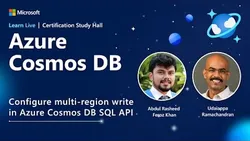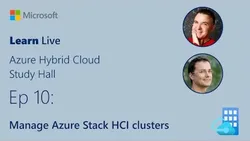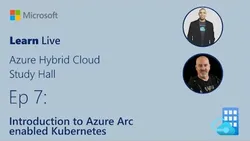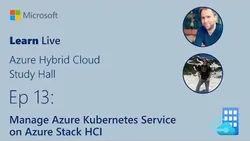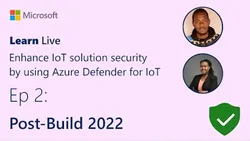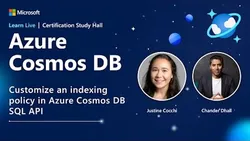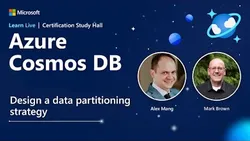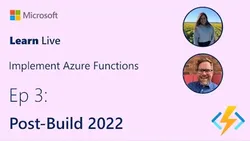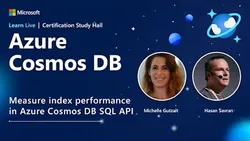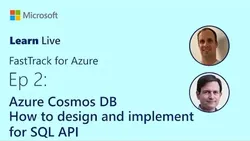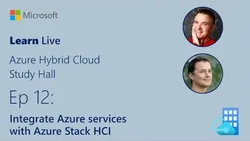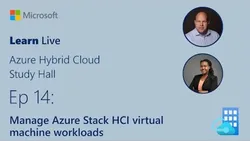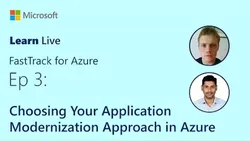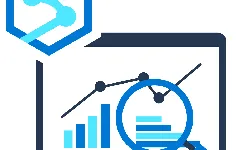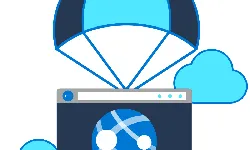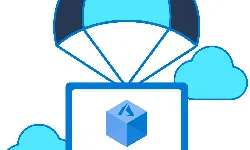Free Online Microsoft Azure Courses and Certifications 2024
Microsoft Azure is a cloud computing platform and infrastructure created by Microsoft. It offers a wide range of services, including analytics, storage, networking, and more. It is suitable for businesses of all sizes, and is used in many fields, such as healthcare, finance, and retail. People with knowledge of Azure can benefit from related courses, such as Azure Fundamentals, Azure Security, and Azure DevOps.
Popular Courses
This course will provide an introduction to multi-region write in Azure Cosmos DB SQL API. Participants will learn how to configure multi-region support in the SDK, understand conflict resolution policies, and create custom conflict resolution policies. Through an exercise, participants will connect a multi-region write account with the Azure Cosmos DB SQL API SDK. At the end of the course, participants will have a knowledge check to assess their understanding of the material. Finally, the course will conclude with a summary and conclusion.
Learn MoreWelcome to Learn Live - Manage Azure Stack HCI clusters! In this course, you will learn how to manage an Azure Stack HCI cluster, update an Azure Stack HCI cluster, configure an Azure Stack HCI cluster quorum, implement an Azure Stack HCI stretched cluster, add and remove cluster nodes. Through demos and knowledge checks, you will gain the skills and knowledge to confidently manage Azure Stack HCI clusters. At the end of the course, you will have a comprehensive understanding of Azure Stack HCI clusters and be able to confidently manage them.
Learn MoreWelcome to Learn Live - Introduction to Azure Arc enabled Kubernetes! In this course, you will learn about Kubernetes and Azure Arc, the architecture, components, and characteristics of Azure Arc Enabled Kubernetes, how to onboard a server with the Connected Machine Agent, how to connect Kubernetes clusters to Azure Arc, how to integrate an Azure Arc enabled Kubernetes cluster with Azure Policy for Kubernetes, how to assign a policy to an Arc Enabled Kubernetes cluster, and how to apply Azure Arc enabled Kubernetes cluster configurations by using GitOps. Through knowledge checks and demos, you will gain a comprehensive understanding of Azure Arc enabled Kubernetes. By the end of this course, you will have the skills and knowledge to effectively use Azure Arc enabled Kubernetes.
Learn MoreWelcome to Learn Live - Manage Azure Kubernetes Service on Azure Stack HCI! In this course, you will learn how to deploy and manage Kubernetes clusters on Azure Stack HCI. We will cover topics such as an overview of Kubernetes and AKS, public preview of SDN integration with AKS HCI, deploying an AKS cluster to Azure Stack HCI, deploying a Kubernetes cluster to Azure Stack HCI, connecting Azure Kubernetes Service on Azure Stack HCI to Azure Arc for Kubernetes, managing pods on multi-pool Kubernetes clusters, managing pod storage on Kubernetes clusters, implementing containerized Windows workloads, and troubleshooting Azure Kubernetes Service on Azure Stack HCI. Throughout the course, you will be tested on your knowledge with Knowledge Checks. At the end of the course, you will have a comprehensive understanding of how to manage Azure Kubernetes Service on Azure Stack HCI.
Learn MoreWelcome to Learn Live - Enhance IoT solution security by using Azure Defender for IoT. In this course, you will learn how to secure your IoT solutions by using Azure Defender for IoT. We will review security recommendations, identity and access management, networking, and monitoring. We will examine IOT security infrastructure from the ground up, threat modeling and mitigation techniques, and Azure Security Center and Azure Defender for IOT. We will also examine Azure Defender for IoT features and requirements and do a demo. There will be knowledge checks throughout the course and a summary and conclusion at the end. Join us to learn how to secure your IoT solutions with Azure Defender for IoT.
Learn MoreWelcome to Learn Live - Customize an indexing policy in Azure Cosmos DB SQL API! In this course, you will learn how to optimize an Azure Cosmos DB SQL API container's index policy for common operations. We will start by introducing the concept of indexing and its usage. Then, we will review read-heavy and write-heavy index patterns. After that, we will demonstrate how to customize an indexing policy in Azure Cosmos DB SQL API. Finally, we will review the knowledge with a knowledge check and conclude with a summary. Join us to learn how to customize an indexing policy in Azure Cosmos DB SQL API!
Learn MoreThis course will teach you how to design a data partitioning strategy. You will learn how to denormalize data in your model, manage referential integrity by using change feed, combine multiple entities in the same container, denormalize aggregates in the same container, and finalize the data model. You will also have the opportunity to exercise advanced modeling patterns and test your knowledge with a knowledge check. At the end of the course, you will have a comprehensive understanding of data partitioning strategies.
Learn MoreThis course will provide an introduction to Azure Functions and teach you how to create and deploy them. You will learn how to compare Azure Functions hosting options, scale Azure Functions, explore Azure Functions development, create triggers and bindings, and connect functions to Azure services. You will also have the opportunity to create an Azure Function by using Visual Studio Code. At the end of the course, you will have a comprehensive understanding of Azure Functions and be able to confidently create and deploy them.
Learn MoreThis course will teach you how to measure index performance in Azure Cosmos DB SQL API. We will start by introducing the learning objectives and enabling indexing metrics. We will then demonstrate how to analyze indexing metrics results and measure query cost. We will also measure point operation cost and provide an exercise to optimize an Azure Cosmos DB SQL API container's index policy for a specific query. Finally, we will have a knowledge check and summary to conclude the course.
Learn MoreThis course provides an introduction to Azure Cosmos DB and how to design and implement for SQL API. It covers the fundamentals of the platform, including learning objectives, context, demos, diagnostics, and more. Participants will gain an understanding of the features and capabilities of Azure Cosmos DB, and how to use them to design and implement a SQL API. Through hands-on demos, participants will learn how to create and manage databases, collections, and documents, as well as how to query and analyze data. At the end of the course, participants will have a better understanding of the platform and be able to confidently design and implement a SQL API.
Learn MoreThis course will provide an introduction to integrating Azure services with Azure Stack HCI. Participants will learn how to monitor Azure Stack HCI by using Azure Monitor, protect Azure Stack HCI VMs by using Azure Site Recovery and Azure Backup, and implement Azure Network Adapter in Azure Stack HCI scenarios. Throughout the course, participants will be given knowledge checks to assess their understanding of the material. At the end of the course, participants will have a comprehensive understanding of how to integrate Azure services with Azure Stack HCI.
Learn MoreWelcome to Learn Live - Manage Azure Stack HCI virtual machine workloads! In this course, you will learn how to manage Azure Stack HCI virtual machines (VMs) by using Windows Admin Center. You will also learn how to configure affinity, load balancing, and GPU support for Azure Stack HCI VMs. Additionally, you will learn how to implement VDI and trusted enterprise virtualization in Azure Stack HCI. After completing this course, you will be able to confidently manage Azure Stack HCI VMs and configure them for optimal performance.
Learn MoreThis course, Learn Live - Choosing Your Application Modernization Approach in Azure, provides an introduction to the process of migrating and modernizing applications to Azure. It covers the learning objectives, learn collection, and the benefits of moving to Azure. It also covers the Azure migration and modernization drivers, cloud journey phases, and Azure migration and modernization tools. You will learn how to rehost an on-premises application on Azure VMs by using Azure Migrate, host a web application with Azure App Service, and design a basic web application and microservices architecture. Finally, you will learn how to design a serverless functions architecture and summarize and conclude the course. This course will help you accelerate your migration and modernization journey to Azure.
Learn MoreThis course provides an introduction to operational analytics with Microsoft Azure Synapse Analytics, including how to use the Azure Synapse Link feature to perform analytics against Azure Cosmos DB.
Learn MoreThis course will demonstrate how to deploy a website to Azure using Azure App Service, allowing users to focus on website features while relying on the secure Azure platform for access.
Learn MoreLearn how to deploy a website with Azure Virtual Machines in this course. Gain the skills to customize and control every aspect of a webserver on Linux and Windows.
Learn More Microsoft Azure Courses
Career Trends
Career Prospects
| Average Salary | Position Overview
|
| Senior Data Engineer | $203,025 per year
| The Senior Data Engineer is responsible for managing the data integration tasks of the department, which includes creating and maintaining a data model, managing the data warehouse and analytics environment, and developing scripts for data analysis and integration. |
| Senior Strategy Consultant | $116,798 per year | A Senior Strategy Consultant is responsible for evaluating a business's practices and implementing strategies to optimize their operations. They work closely with senior management to make critical decisions regarding cost reduction and revenue growth. |
| Machine Learning Engineer | $197,556 per year | Machine learning engineers develop and construct AI algorithms that can learn and make predictions, which are the core of machine learning (ML). They usually work as part of a larger team of data scientists, and collaborate with other professionals such as administrators, data analysts, data engineers, and data architects. |
| Test Developer | $133,058 per year | Test developers are responsible for designing and implementing software programs that automatically detect any bugs or defects in software. They must have expertise in programming languages like JavaScript, PERL, and HTML. They typically use quality testing tools like ALM to carry out their work. |
| Database Specialist | $37.77 per hour | A Database Specialist is responsible for creating, managing, and maintaining complex databases. This includes ensuring efficient access, allocating storage resources, implementing validation checks, organizing data, maintaining security protocols, and documenting processes. Additionally, they may use statistical methods to analyze data and optimize performance. |
Educational Paths
1. Microsoft Learn: This is an online learning platform that offers free self-paced courses and interactive tutorials for learning Azure. The courses range from beginner to advanced levels and cover a wide range of Azure topics, such as cloud computing, data analytics, and artificial intelligence. You can earn certifications and badges for completing these courses.
2. Azure certifications: Microsoft offers a range of Azure certifications that demonstrate your proficiency in specific Azure technologies and services. These certifications include Azure Administrator, Azure Developer, Azure Security Engineer, and Azure AI Engineer. Each certification requires passing one or more exams, and Microsoft offers online training and resources to help you prepare for the exams.
3. Microsoft Virtual Academy: This is another free online learning platform that offers courses on Azure and other Microsoft technologies. The courses are taught by Microsoft experts and cover a wide range of topics, such as cloud computing, machine learning, and DevOps.
Frequently Asked Questions and Answers
Q1: What is Microsoft Azure used for?
Microsoft Azure is a cloud computing platform that provides a broad range of services, including compute, analytics, storage, and networking. It is a reliable, scalable, and secure platform that can be used to build and deploy applications and services.
Q2: What is difference between Microsoft Azure and cloud?
The cloud is a broad term for a network of remote servers that are accessed over the internet. Azure is a specific cloud computing platform offered by Microsoft. It provides a broad range of services, including compute, storage, networking, analytics, machine learning, IoT, and DevOps. Azure can be used by businesses of all sizes to build, deploy, and manage applications and services.
Q3: What Microsoft Azure courses can I find on AZ Class?
On this page, we have collected free or certified 1744 Microsoft Azure online courses from various platforms. The list currently only displays up to 50 items. If you have other needs, please contact us.
Q4: Can I learn Microsoft Azure for free?
Yes, If you don’t know Microsoft Azure, we recommend that you try free online courses, some of which offer certification (please refer to the latest list on the webpage as the standard). Wish you a good online learning experience!
